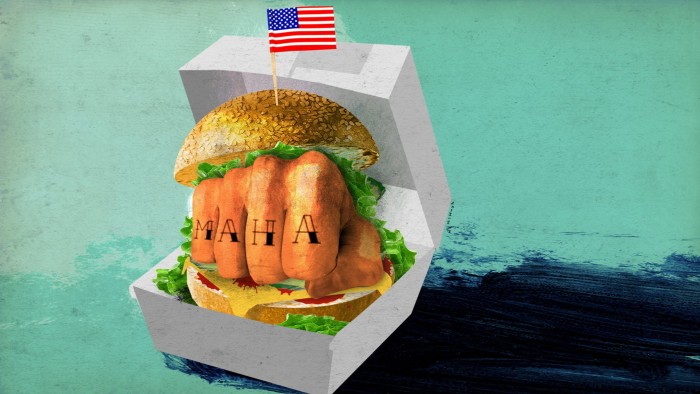Unlock the Editor’s Digest for free
Roula Khalaf, Editor of the FT, selects her favourite stories in this weekly newsletter.
How delicious to see the American food and drink industry meet its match, in the unlikely duo of Donald Trump and his health secretary, Robert F Kennedy Jr.
This is an industry that has influenced diets the world over. If you’ve taken the kids to a hotel this summer, you may even now be wrestling to limit their intake of those yummy sweet globules that pass for breakfast cereal.
Ever since American fast food conquered the world, global rates of chronic disease have been rising. For decades, fat, sugar and additives have been linked to obesity and related conditions. Big Food has used every trick in the book to keep it that way. Even Michael Bloomberg, when mayor of New York, couldn’t get the drinks industry to reduce its supersized sodas. It campaigned, sued and won. I’d never have imagined that the founding fathers wanted citizens to have a constitutional right to guzzle high fructose corn syrup. But it seems they did.
Kennedy ’s strange views on science and vaccine scepticism have overshadowed what he is right about: diet, certain additives and the insidious links between the food industry and regulators. The Make America Healthy Again (Maha) report, with its critique of ultra-processed foods, chemicals, overprescribing and the corporate capture of regulatory systems, makes good reading for every consumer health advocate worldwide. But it is seminal in the US, where no party until now has made a concerted stand against the lobbies.
The fight for our food is a global moral crusade. It is the poorest people in rich countries who are most likely to be afflicted by chronic disease, and earliest in life. Gains in life expectancy are not being matched by improvements in years of health, according to the World Health Organization. There is a gap of more than 10 years in healthy life expectancy between people living in the least and the most deprived parts of the US and UK. Japan seems to be the only country where the two keep pace. It has a diet rich in fish and vegetables, a heavy emphasis on preventive health and remarkably few burger bars and junk food shops, even in Tokyo.
There’s also a strong economic imperative. As the rich world ages and birth rates fall, the only hope of maintaining per head GDP is to tackle the long-term illnesses that burden healthcare systems and reduce the workforce. Ageing tends to slow GDP per head, because of the skewed ratios of retired people to working adults. Societies should be able to mitigate some of the economic consequences by raising the retirement age in line with longer life expectancy. But this can’t be done unless older people stay healthy and keep working.
We tend to overlook how much our prosperity owes to past improvements in health. Almost a third of the UK’s economic growth between 1790 and 1980 has been attributed to better health and diet. Studies have found that it boosted the rate of economic growth by about 30 per cent in Australia, Germany, Japan and seven other industrialised countries across the 130 years to 1990. A recent European Commission report confirms the link between investing in health and economic development.
Public health messages are often dismissed as low priority, even as nanny statism. Both arguments are likely to be employed by US congressional Republicans, especially those representing farmers. But with the coming challenge of depopulation, the idea should be dawning everywhere that a healthy citizenry is a source of competitive advantage. Countries beset by type 2 diabetes and heart disease are undermining their own productivity.
Cardiovascular disease (CVD) is not just bad for those who suffer from it but for economies too. It often hits people of working age and can leave them impaired for decades. In 2021, CVD cost the EU around €282bn. An analysis of 26 higher-income countries between 1960 and 2000 found a strong correlation between falling deaths from heart disease and subsequent economic growth: a 10 per cent reduction in cardiovascular mortality was associated with a roughly 1 per cent increase in income per head. As countries grow rich, the authors warn, they should make sure that “diseases of affluence” don’t end up as obstacles to affluence.
When millions of people are unemployed because of long-term health problems and lives are blighted by multiple illnesses, it’s time to realise that health and wealth are two sides of the same coin. We know, for example, that damage to arteries begins in childhood, progressing silently over time.
It’s not clear how much even a zealot like Kennedy can achieve. Some food manufacturers have signed up to Maha, and there has been an explosion in state proposals to ban certain additives. Four states have announced their intention to stop food stamp use for candy and soft drinks. But Trump’s bullying tactics may reach a limit. Mars is holding out against changing the food dyes in M&Ms. Coca-Cola has softened its position on corn syrup, but not abandoned it.
We’ve all fallen into some bad habits and changing them is a long game. But the rest of the world should take America’s cue. We should leverage its wins, ratcheting up pressure on our own vested interests. And we should seize on its failures to bolster our own economic advantage. Health is an economic trump card.
camilla.cavendish@ft.com

